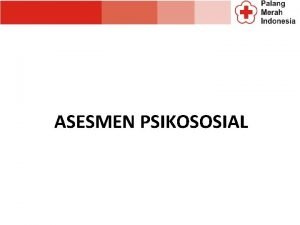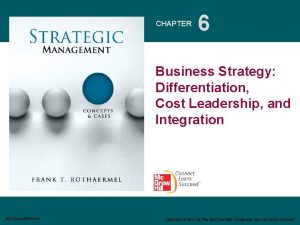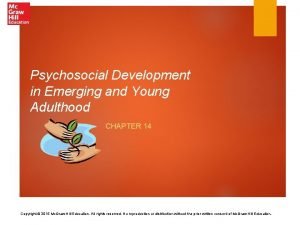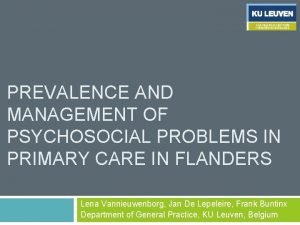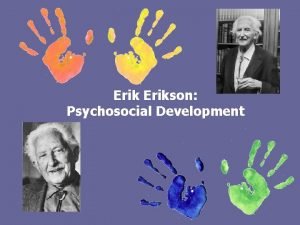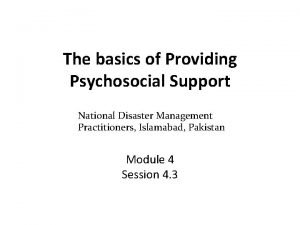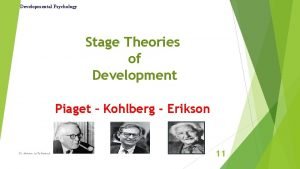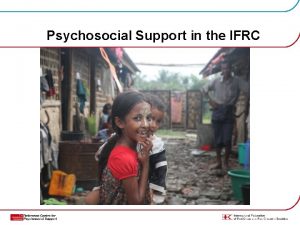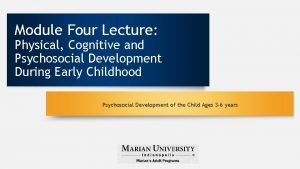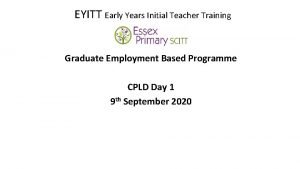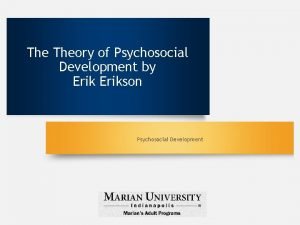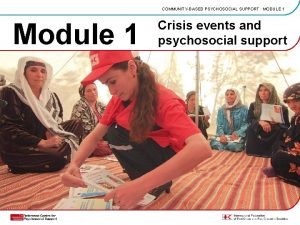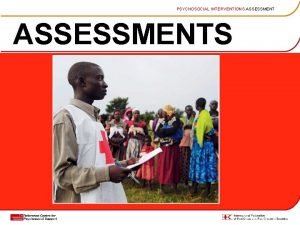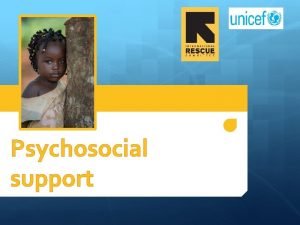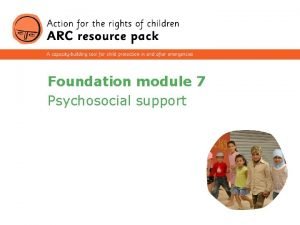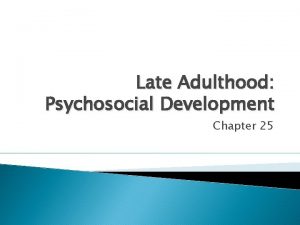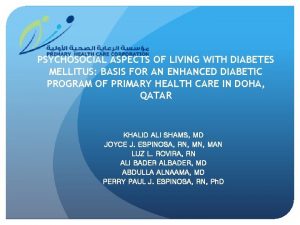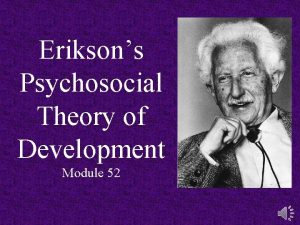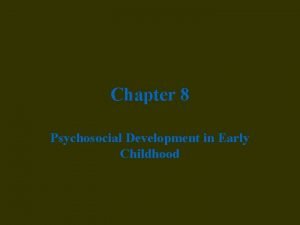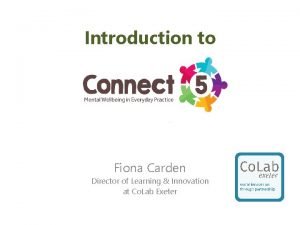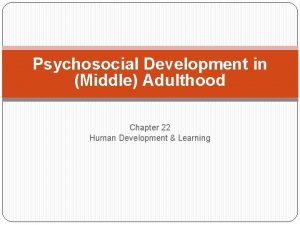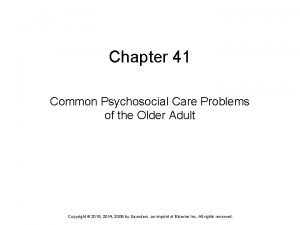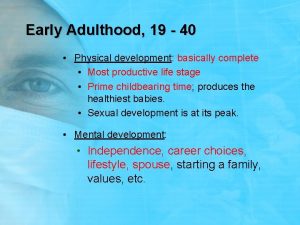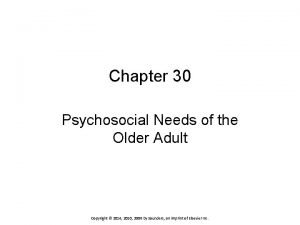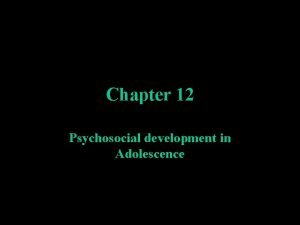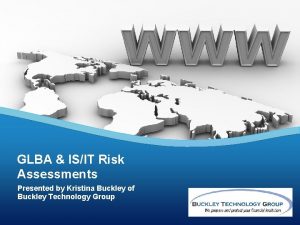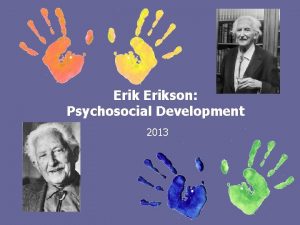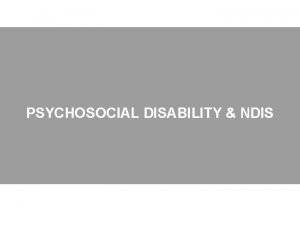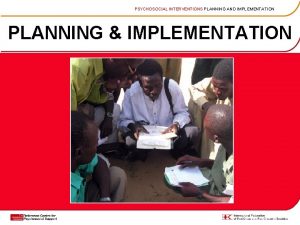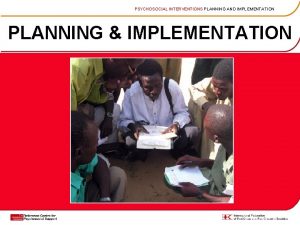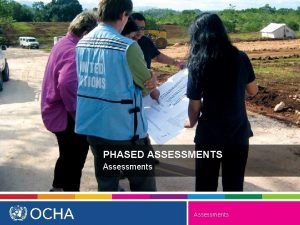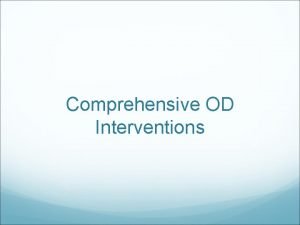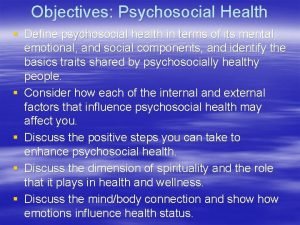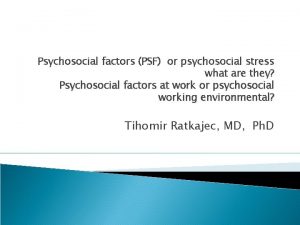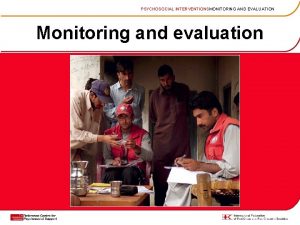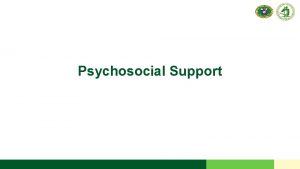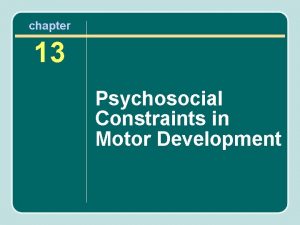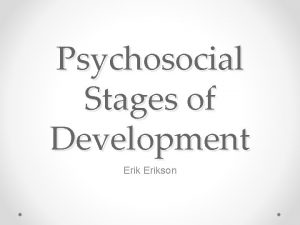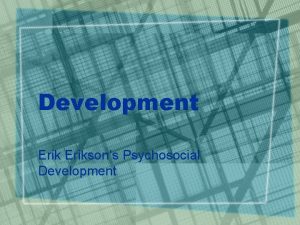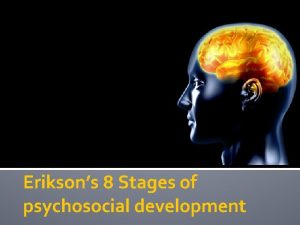PSYCHOSOCIAL INTERVENTIONS ASSESSMENTS PSYCHOSOCIAL INTERVENTIONS ASSESSMENT Focus of










































- Slides: 42

PSYCHOSOCIAL INTERVENTIONS ASSESSMENTS

PSYCHOSOCIAL INTERVENTIONS ASSESSMENT Focus of this workshop session What are psychosocial assessments? Why are assessments needed? What kinds of assessments are there? When are assessments done? How do you do assessments? Who conducts assessments? Who provides information

PSYCHOSOCIAL INTERVENTIONS ASSESSMENT What are psychosocial assessments? • Tools that help to find facts about psychosocial wellbeing and psychosocial needs • Measure and report impact of disaster / crisis on population (reactions, needs and resources) – including impact on psychosocial wellbeing and coping • Help to identify vulnerable sub-groups • Guide the ‘where, when, what and how’ to planning and implementing a psychosocial intervention

PSYCHOSOCIAL INTERVENTIONS ASSESSMENT Why are psychosocial assessments needed? Partner buzz and group brainstorm Why are psychosocial assessments needed after every new disaster event or in every new crisis situation?

PSYCHOSOCIAL INTERVENTIONS ASSESSMENT Why are assessments needed? All disaster and crises events are unique Impact – people (physical, social, emotional) environment, infrastructure, economic, political, cultural Affected population – number, ages, gender Reactions of – people, government, NGOs (local / international), other assisting bodies Needs – basic needs, psychosocial, medical, educational Resources available – people, economic, political, local and international assistance, etc. Opportunities for responses

PSYCHOSOCIAL INTERVENTIONS ASSESSMENT Why are assessments needed? Psychosocial Assessments Assumptions Inappropriate Unrealistic psychosocial Interventions Realistic Appropriate Well-planned Psychosocial Interventions

PSYCHOSOCIAL INTERVENTIONS ASSESSMENT Two types of assessments Needs assessments: explore impact of event; reactions, needs and resources of affected population Examples • Rapid assessments • In-depth (detailed) detailed assessments • Continuous assessments (monitoring)

PSYCHOSOCIAL INTERVENTIONS ASSESSMENT Types of assessments Impact assessments: collects data that can be used to measure impact of psychosocial intervention / response • Baseline study • Continuous assessments (monitoring) • Mid-term evaluations • Final evaluations

PSYCHOSOCIAL INTERVENTIONS ASSESSMENT Psychosocial needs assessments foci • Demographics: who, where, population characteristics • Impact of event: physical, social, emotional • Problems: present and future • Resources and capacities: to help themselves and each other (coping mechanisms) • Assistance needed

PSYCHOSOCIAL INTERVENTIONS ASSESSMENT Psychosocial impact assessments foci • Demographics: who, where, population characteristics • Impact of event: physical, social, emotional (past and present) • Problems: Past, present and future • Resources and capacities: to help themselves and each other (coping mechanisms) before and now • Assistance given already and still needed

PSYCHOSOCIAL INTERVENTIONS ASSESSMENT Impact assessments help us to determine Impact of psychosocial intervention=desired impact or not? Improved psychosocial well-being? Need for adaptation of psychosocial intervention/response?

PSYCHOSOCIAL INTERVENTIONS ASSESSMENT When are assessments done?

PSYCHOSOCIAL INTERVENTIONS ASSESSMENT When are assessments done?

PSYCHOSOCIAL INTERVENTIONS ASSESSMENT Rapid assessments • Immediately after a disaster • Collaborated effort between responders (desired) • Preparation for immediate and urgent response o Primary focus – survival: basic and medical needs Examples: Field and assessments coordination teams (FACT) and Regional Disaster Response Teams (RDRT)

PSYCHOSOCIAL INTERVENTIONS ASSESSMENT Rapid assessments Psychosocial foci Shock, disorientation, major and minor distress, immediate concerns, loss of ‘sense of place’ Typical response • Psychological First Aid • Restoring family links • Restoration of ‘sense of normality’ • “Normal reactions to abnormal events”

PSYCHOSOCIAL INTERVENTIONS ASSESSMENT Example of assessment timeline

PSYCHOSOCIAL INTERVENTIONS ASSESSMENT Detailed assessments • Weeks or even months after crisis event • Motivated by indication of psychosocial needs • Analysis of community structures and opportunities for long term psychosocial interventions Focus is on realistic, appropriate long-term interventions

PSYCHOSOCIAL INTERVENTIONS ASSESSMENT Example of assessment timeline

PSYCHOSOCIAL INTERVENTIONS ASSESSMENT Baseline study • What is a baseline study? • What is it used for? • Has anyone been involved in designing or collecting data for a baseline study?

PSYCHOSOCIAL INTERVENTIONS ASSESSMENT Baseline study • Designed and undertaken AFTER the intervention has been planned • Used to provide BASELINE or FIRST SET of data to compare future monitoring and evaluation with • Important tool for mid-term and final evaluations • Measures INDICATORS of psychosocial wellbeing – that are then measured again later

PSYCHOSOCIAL INTERVENTIONS ASSESSMENT Example of assessment timeline

PSYCHOSOCIAL INTERVENTIONS ASSESSMENT Continuous assessments • Used for monitoring purposes • Keep track of progress and challenges • Provide guidance for needed adaptation

PSYCHOSOCIAL INTERVENTIONS ASSESSMENT Evaluations • Mid-term and final • Focus on past, present and future • Larger and often more costly than other assessments • Valuable information to donors, program managers, participants and beneficiaries, progressing field of PSS.

PSYCHOSOCIAL INTERVENTIONS ASSESSMENT How to conduct assessments Two main types of data collected Quantitative Surveys Questionnaires Psychometric tools 1, 2, 3 =, %, a: b Qualitative Key informant interviews Focus Group Discussions Observations Word descriptions

PSYCHOSOCIAL INTERVENTIONS ASSESSMENT How to conduct assessments In small groups discuss the two qualitative data collection methods given below, answering the given questions. Focus group discussions Community mapping 1. What are they? How do you ‘do’ them? 2. Why are they useful in psychosocial interventions? 3. What considerations should you make regarding GENDER and AGE of participants in these methods, and WHY?

PSYCHOSOCIAL INTERVENTIONS ASSESSMENT Designing an assessment 1. Background information • Reports • Documents • Completed assessments by others 2. PSWB Info • What info is missing to assess PSWB and PSS needs? 3. Program considerations • Time frame: short or long term?

PSYCHOSOCIAL INTERVENTIONS ASSESSMENT Designing an assessment 4. Data collection • Appropriate and effective methods • Review and adapt previous tools • Ensure every question is appropriately worded • If possible, pre-test • Suitable and well trained data collectors • Approach (bring gifts/information leaflets? , time of collection, etc)

PSYCHOSOCIAL INTERVENTIONS ASSESSMENT Exploring psychosocial wellbeing Contextually, culturally defined MEANING of psychosocial wellbeing typically differs from Population A to Population B Buzz groups: Can you think of different populations that you know, where the meaning of psychosocial wellbeing differs?

PSYCHOSOCIAL INTERVENTIONS ASSESSMENT Exploring psychosocial wellbeing Example questions: • How do you know when people in your community are doing well? Not doing well? (meaning of PSWB) • How are they doing now? (PSS needs) • What has changed in your daily life and in the community following the crisis event? (meaning and needs) • How are people helping each other? (coping, social support systems)

PSYCHOSOCIAL INTERVENTIONS ASSESSMENT Exploring psychosocial wellbeing • What were the good things in your life prior to the crisis event? (meaning of PSWB, PSS needs) • What changes would be desirable for you and for your community in the next month and within a year? (meaning of PSWB, PSS needs) • What would be good for the children? (meaning of PSWB, PSS needs) • How can you and your community contribute towards such changes? (coping, resources)

PSYCHOSOCIAL INTERVENTIONS ASSESSMENT Loss of livelihoods Loss of house Previous experience Death of loved ones Witness death/traumatic events Separation from family members Injury Perception and understanding of event Traumatic experiences Feelings of stress Disturbing and unusual behaviour Social Name/age/gender Psychological Basic Information Examples of focus areas in PSS assesments Family structure Status in the community Available support systems Access to assistance

PSYCHOSOCIAL INTERVENTIONS ASSESSMENT Collecting the data Who should collect data in a population affected by a crisis? Local volunteers • Trained in basic psychosocial support • Trained in appropriate data collection approach

PSYCHOSOCIAL INTERVENTIONS ASSESSMENT Collecting the data Who provides the information?

PSYCHOSOCIAL INTERVENTIONS ASSESSMENT Collecting the data Who provides the information? Local administration Teachers Parents Children

PSYCHOSOCIAL INTERVENTIONS ASSESSMENT Collecting the data - triangulation Adults FGDs Same Topic Children FGDs Youth FGDs

PSYCHOSOCIAL INTERVENTIONS ASSESSMENT Collecting the data - triangulation Adults FGDs Same Topic Adults Key informant interviews Adults surveys

PSYCHOSOCIAL INTERVENTIONS ASSESSMENT Collecting psychosocial data Affected population Sensitive, emotional topics Painful experiences High levels of distress Fearful of the future/unknown Staff and volunteers Training + supervision - Providing PFA/PSS - Peer support - Self-care Affected population Providing data = sharing = finding solutions = empowerment = coping = improve PSWB

PSYCHOSOCIAL INTERVENTIONS ASSESSMENT Collecting the data Ethical principals to data collection 1. Well planned and justifiable 2. Coordination 3. Clarifying aims and procedures 4. Participatory and collaborative

PSYCHOSOCIAL INTERVENTIONS ASSESSMENT Collecting the data Ethical principals to data collection 5. Comparison groups 6. Conduct and consent 7. Privacy and confidentially 8. Anticipate adverse consequences

PSYCHOSOCIAL INTERVENTIONS ASSESSMENT Interviewing children Ethical principals to data collection with children • Inform community • Consent from caregiver AND child • Interview in safe spaces • Specific training for working with children

PSYCHOSOCIAL INTERVENTIONS ASSESSMENT Assessment analysis and action

PSYCHOSOCIAL INTERVENTIONS ASSESSMENT Final considerations In groups of 4 discuss the 2 following statements and then explain further to plenary 1. It is important to conduct psychosocial assessments in collaboration with other stakeholders working in the same area with the same population. 2. Share findings of psychosocial assessments with others, both working with psychosocial and with other focus areas.
 Psychosocial assessment
Psychosocial assessment Porter's generic strategies
Porter's generic strategies Cost focus and differentiation focus
Cost focus and differentiation focus Actor focus vs object focus
Actor focus vs object focus Prolepsis
Prolepsis Focus or ongoing assessment
Focus or ongoing assessment Emerging adulthood psychosocial development
Emerging adulthood psychosocial development Definition of psychosocial problems
Definition of psychosocial problems Psychosocial environment meaning
Psychosocial environment meaning Basic trust vs mistrust example
Basic trust vs mistrust example Types of psychosocial support
Types of psychosocial support Erikson's psychosocial theory of development
Erikson's psychosocial theory of development Types of psychosocial support
Types of psychosocial support World association for psychosocial rehabilitation
World association for psychosocial rehabilitation Chapter 10:3 psychosocial changes of aging
Chapter 10:3 psychosocial changes of aging Psychosocial tasks
Psychosocial tasks Define physical cognitive and psychosocial development
Define physical cognitive and psychosocial development Erickson's psychosocial theory of development
Erickson's psychosocial theory of development Psychosocial stages
Psychosocial stages Autonomy versus shame
Autonomy versus shame Psychosocial issues
Psychosocial issues Interdependence is a psychosocial concept
Interdependence is a psychosocial concept Psychosocial module 1
Psychosocial module 1 Psychosocial information
Psychosocial information Types of psychosocial support
Types of psychosocial support 7 psychosocial support
7 psychosocial support Psychosocial development in late adulthood
Psychosocial development in late adulthood Psychosocial aspects of living with diabetes
Psychosocial aspects of living with diabetes Trust vs mistrust
Trust vs mistrust Psychosocial factors examples
Psychosocial factors examples Psychosocial development in early childhood
Psychosocial development in early childhood Fiona
Fiona Chapter 7 human growth and development
Chapter 7 human growth and development Middle adulthood psychosocial development
Middle adulthood psychosocial development Psychosocial and aesthetic factors
Psychosocial and aesthetic factors Erikson's psychosocial crisis
Erikson's psychosocial crisis Common psychosocial care problems of the elderly
Common psychosocial care problems of the elderly Early adulthood physical development
Early adulthood physical development Psychosocial environment
Psychosocial environment Psychosocial needs of the elderly
Psychosocial needs of the elderly Psychosocial development in adolescence
Psychosocial development in adolescence Glba risk assessment
Glba risk assessment Aimsweb plus
Aimsweb plus
